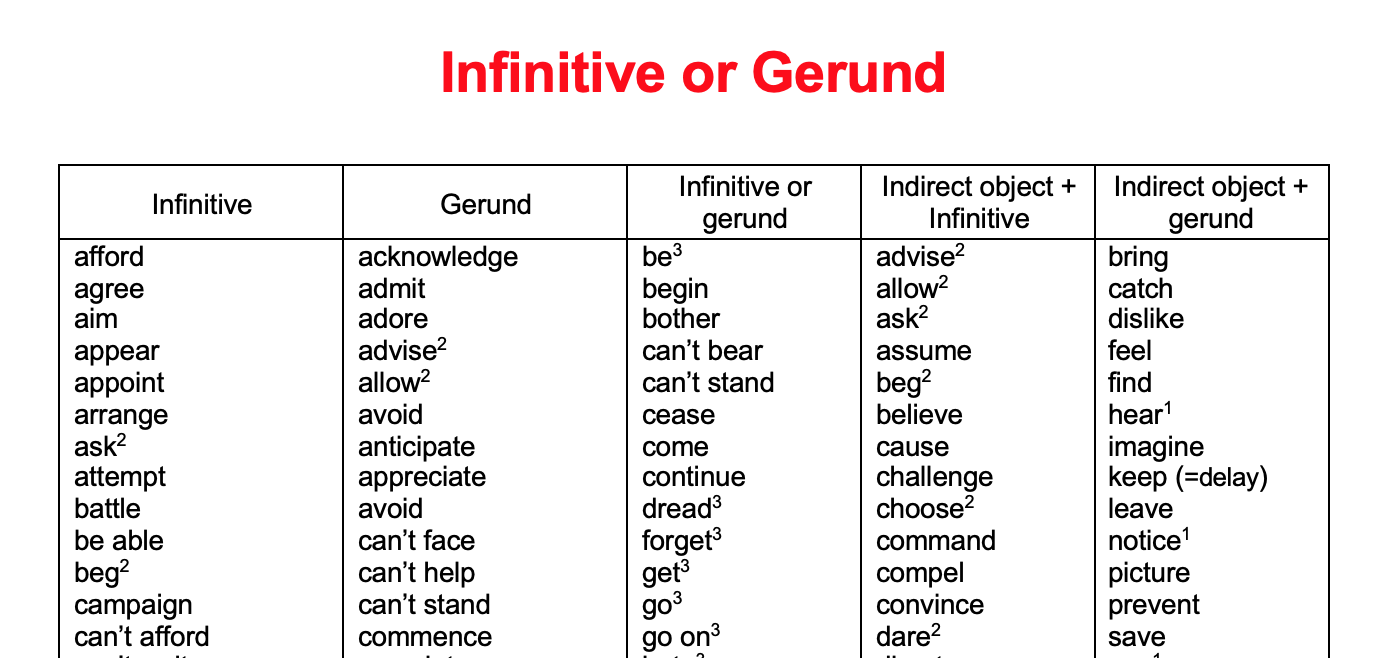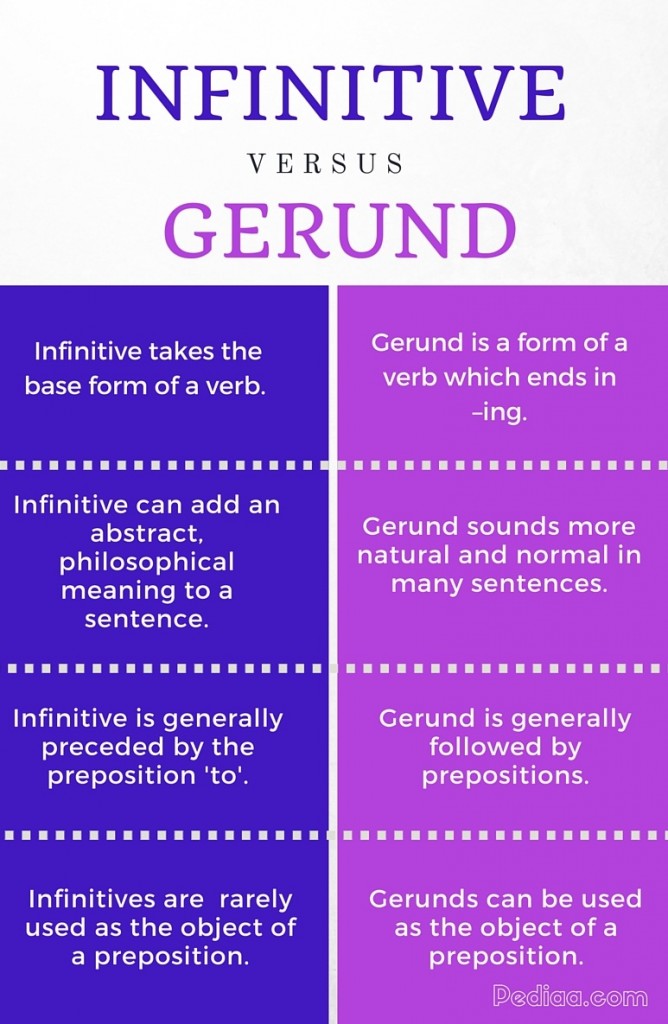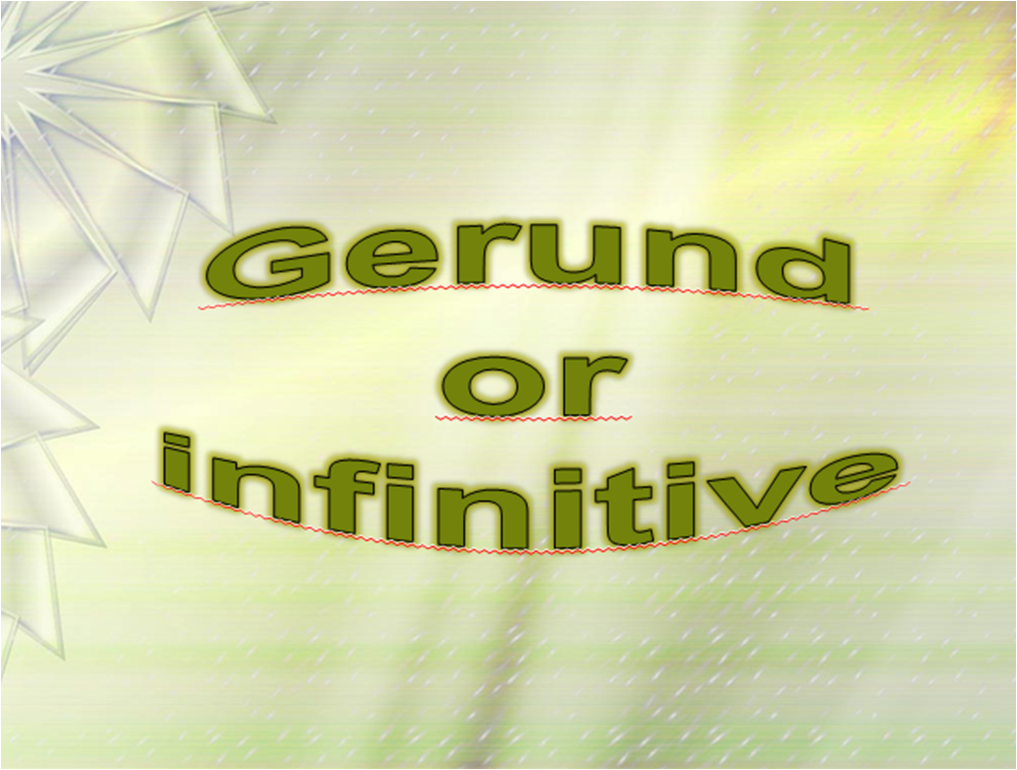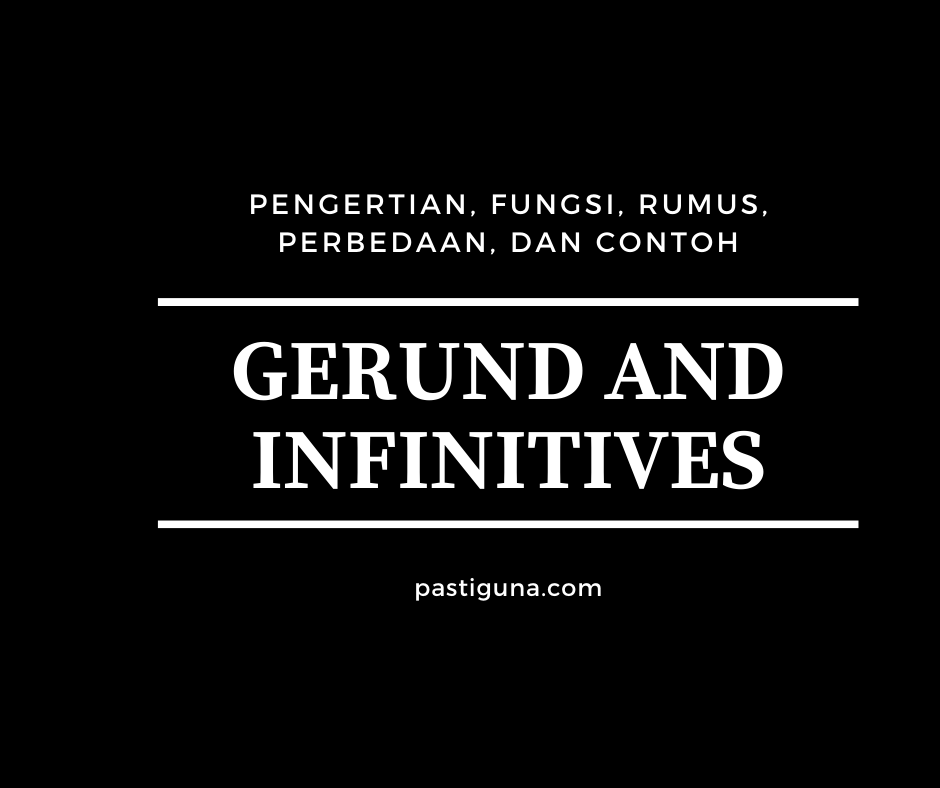
Infinitive or Gerund
Infinitive: To be happy is a state of mind. Gerund: Being happy is a state of mind. Here are some more examples from literature. Note the slightly solemn tone that the infinitive as subject lends to the sentence. Examples To want is to have a weakness. — Margaret Atwood, The Handmaid's Tale, 1985 To attack the first is not to assail the last.

Gerund Infinitive PDF
from English Grammar Today Appear: how something looks We use appear to say how something looks or seems to look. We usually follow it by an adjective or by a to-infinitive: They appear very disappointed. There appears to be a problem with the car. The people don't appear to know why they are here.

Difference Between Infinitive and Gerund
Infinitive to appear Preterite appeared Past participle appeared Model : obey Auxiliary : have, be Other forms: appear oneself / not appear Contractions Advertising Indicative Present I appear you appear he/she/it appears we appear you appear they appear Preterite I appeared you appeared he/she/it appeared we appeared you appeared they appeared

Calaméo Gerund Infinitive
An infinitive. Also simply put, an infinitive in English is the base form of the verb and it can also act as the object of another verb. In the example above there are two infinitives: to try and to grow . Infinitives in English can appear with and without to before them, so, for example: I prefer to wait.

English 4 You OnLine Gerund or Infinitive
After expressions with 'why' - why go out the night before an exam? Verbs that take the gerund or 'to + infinitive' with examples and exercises: Verbs with gerunds and infinitives part 1 Verbs with gerunds and infinitives part 2 Verbs with gerunds and infinitives part 3 Verbs with gerunds and infinitives part 4
Gerund/Infinitive Quiz
In English grammar, a gerund is simply a verb form ending in -ing and functions as a noun. Walking, holding, and listening may seem like present participles, but they can also be gerunds that function as nouns. For example: Watching the video made me cry. In this sentence, watching functions as a noun, specifically a subject.
GERUND / INFINITIVE Quiz
Gerunds and infinitives are two forms of a verb that are used in a number of structures. Let's explore these forms and explain the different uses of them.. They appear to be happy. He offered to help. 2. verb + noun / pronoun + to-infinitive. allow, advise, ask, encourage, expect, force, invite, need, order, permit, promise, teach, tell.
Gerunds and Infinitives
Seem - English Grammar Today - a reference to written and spoken English grammar and usage - Cambridge Dictionary

Gerund&Infinitive PDF
Verbs Followed by Gerunds and Infinitives. by Alex. In English, if you want to follow a verb with another action, you must use a gerund or infinitive. For example: We resumed talking. (gerund - verb + ing) I want to see a movie. (infinitive - to + base verb) There are certain verbs that can only be followed by one or the other, and these.

Gerund and Infinitives Pengertian, Fungsi, Rumus, Perbedaan dan Contoh
infinitive These verbs are followed by a to -infinitive: I appear to have lost my keys. I happened to be passing your house, and I saw that the door was open. Our predictions proved to be accurate. She seems to understand most of what we say. The library tends to be crowded during the exam period.

The EFL SMARTblog Gerund or Infinitive?
Infinitives vs. gerunds. Infinitives aren't the only verb form that can be used as a noun. A gerund is a verb in the present participle form that also acts as a noun. Although sometimes infinitives and gerunds are interchangeable, on a couple occasions only one is correct. 1 Only gerunds can be the object of prepositions.

Gerund or Infinitive Infinitive and Gerund Infinitive Studocu
Verbs Followed by an Infinitive She agreed to speak before the game. agree aim appear arrange ask attempt be able beg begin care choose condescend: consent continue dare decide deserve detest dislike expect fail forget get happen: have hesitate hope hurry intend leap leave like long love mean neglect: offer ought plan prefer prepare proceed.

SOLUTION Gerund and infinitive Studypool
A gerund is the -ing form of a verb that functions the same as a noun. For example, "Running is fun.". In this sentence, "running" is the gerund. It acts just like a noun. The infinitive.
gerund infinitive Quiz
Exercise 1. Choose the correct gerund or infinitive form for each gap below. 1 used to be my favourite hobby at your age. 2 We talked about together next summer. 4 I think I didn't remember the door when we left. 5 If she doesn't answer, try her mobile. 6 I tried my eyes open, but I eventually fell asleep.

Infinitives Grammar Rules to Master the Use of Infinitives ENJOY THE JOURNEY
In the following sentences, gerunds sound more natural and would be more common in everyday English. Infinitives emphasize the possibility or potential for something and sound more philosophical. If this sounds confusing, just remember that 90% of the time, you will use a gerund as the subject or complement of a sentence. Examples:
Why gerund or infinitive? Match up
By Kenneth Beare Updated on August 26, 2019 Verbs that are followed by other verbs can take either the gerund or the infinitive. A gerund is a verb ending in "ing" that functions as a noun. An infinitive is the basic or root form of a verb, typically preceded with "to."